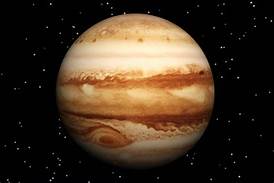Jupitar's magnetic field is the most strongest among all the planets in the solar system at nearly 20,000 times or more of the strength of Earth's. It traps electrically charged particles in an intense belt of electrons and other electrically charged particles that regularly blasts the planet's moons and rings with radiation more than 1,000 times the lethal level for a human, enough to damage even heavily shielded spacecraft, such as NASA's Galileo probe. The magnetosphere of Jupiter swells out some 600,000 to 2 million miles (1 million to 3 million kilometers) toward the sun and tapers to a tail extending more than 600 million miles (1 billion km) behind the massive planet.
Jupiter also spins faster than any other planet, taking a little under 10 hours to complete a turn on its axis, compared with 24 hours for Earth. This rapid spin makes Jupiter bulge at the equator and flatten at the poles.
Jupiter broadcasts radio waves strong enough to detect on Earth. These come in two forms — strong bursts that occur when Io, the closest of Jupiter's large moons, passes through certain regions of Jupiter's magnetic field, and continuous radiation from Jupiter's surface and high-energy particles in its radiation belts.



0 comments:
Post a Comment
if you have any doubt then please in form me.